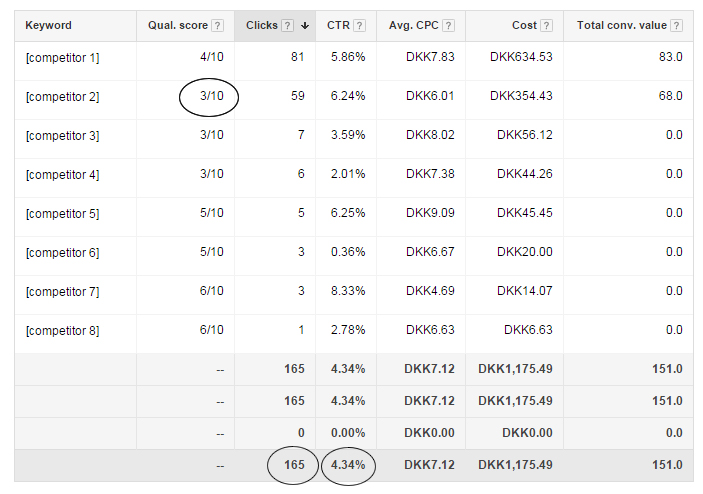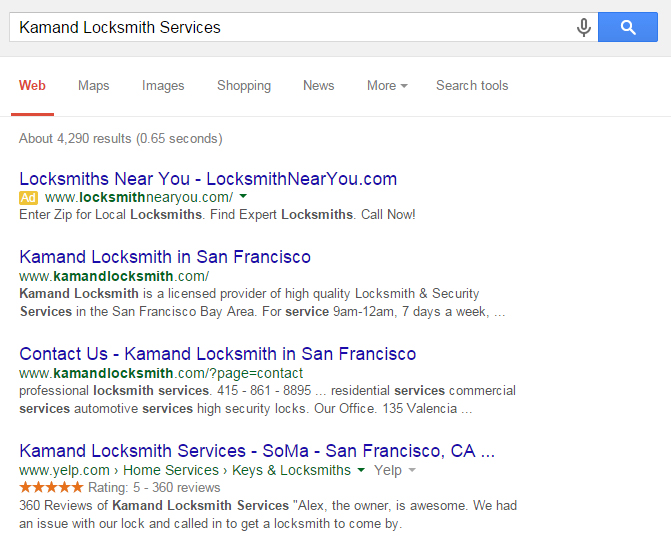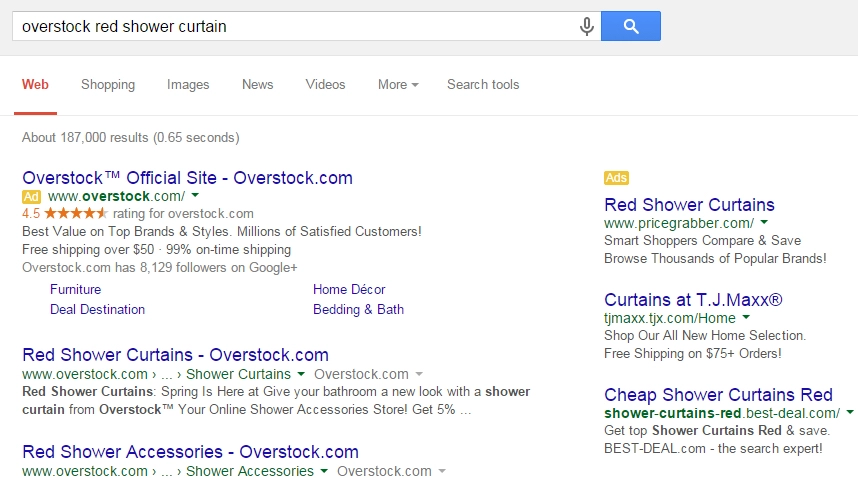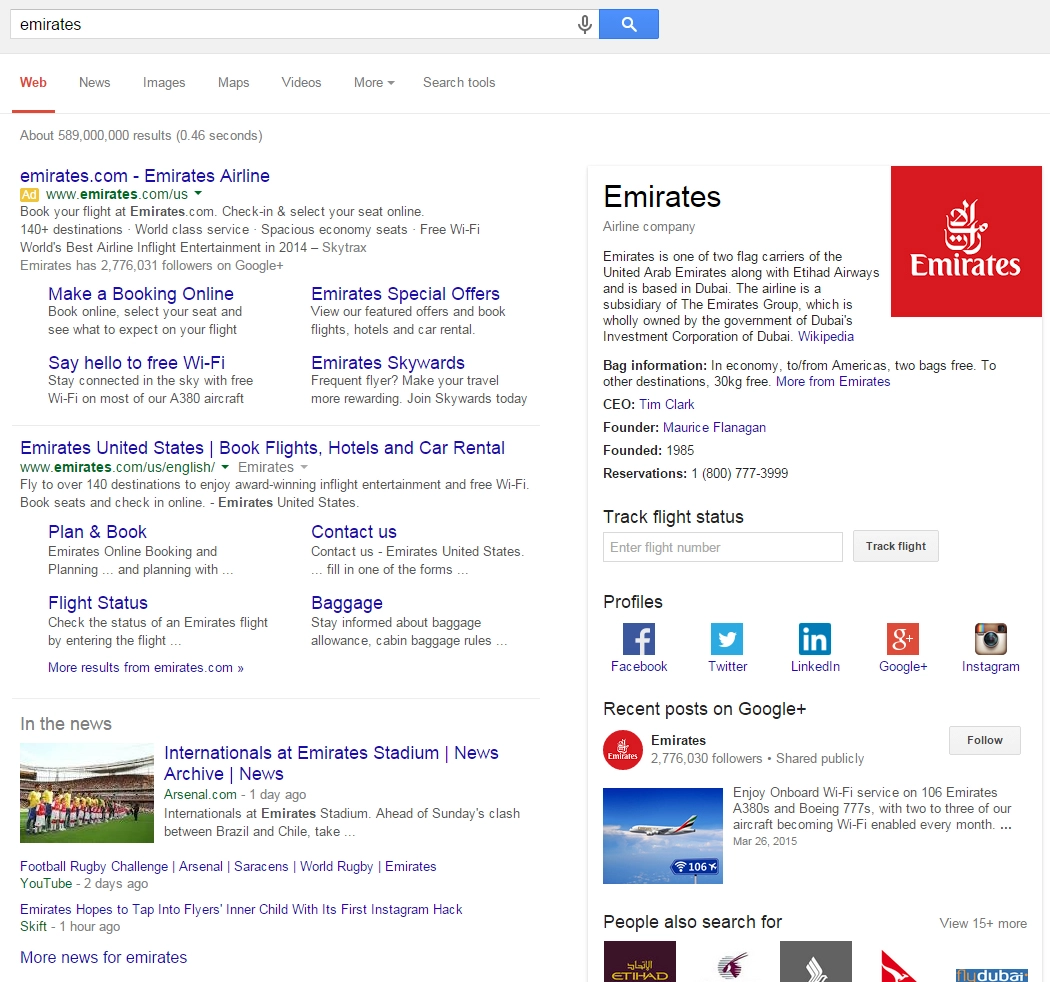Does it pay off to bid on one’s brand name in Google AdWords? The question has been addressed many times, but in this article, we’ll explain in depth why it can be a great idea to bid on your brand name in AdWords.
Is it a waste of money?
New advertisers are often convinced that these ads will not pay off. The argument is that if you already have the top ranking in the organic search results, it would be a waste of money to pay for an ad for the exact same search. In other words – some advertisers are afraid brand ads will cannibalize organic results.
Nonetheless, I would argue that more often than not it is a good idea to bid on your brand name. Let me explain.
Why you should bid on your brand name
1. It’s cheap
In most cases it’s cheap to bid on your brand name since the cost per click is extremely low.
The cost is mainly determined by the Quality Score of the keyword you choose, which is calculated based on three elements:
1. Click-through rate (CTR)
2. Ad relevance
3. Landing page experience
Brand name ads will naturally receive a high click-through rate and since you rarely find a more relevant ad and landing page, you also receive top marks here.
This means that the Quality Score of the brand keywords will often be high and most certainly higher than that of the competitors, who might choose to bid on your brand name and thereby make it cheaper for you.
Take a look at the screenshot below taken from the AdWords account of a Danish clothing retailer.

In this case, the average cost per click has been no more than 0.09 DKK (just shy of 2 cents) for a top position. Note also that the cost of 44.09 DKK (≈ 6 USD) has generated revenue of more than 11,000 DKK (≈ 1.600 USD). This equals a ROAS of more than 250!
One can, of course, argue that this retailer would have received the same amount of revenue through organic results making it unnecessary to spend money on brand ads.
And yes, the shop would most likely have generated this revenue through organic traffic, but why risk it?
In this case, the cost makes out less than 0.4% of the revenue. This means that if 0.4% of the revenue is due to running the brand ads, they have paid off.
2. Avoid losing clicks to your competitors
No matter how you feel about bidding on someone else’s brand name, you must be aware that some companies do this. And wouldn’t you rather spend a few bucks than lose clicks to a cheeky competitor? You can choose to see the advertisement on your own brand as a very cheap insurance premium , which guarantees you most of the potential revenue from searches on your brand.
Many users instinctively click on the top results, because they believe these are the best and most relevant results. A study from 2013 even shows that more than 40% of users are not aware of the fact that the top results of a Google search are paid ads:
“41 out of the 100 individuals tested did not know that Adwords were paid-for adverts, believing them instead to be the most authoritative links.”
The Danish retailer mentioned above was reluctant when I first recommended bidding on his own brand name. He was, however, convinced that we should bid on his competitors’ brands. We tried it for a month, and the results can be seen below.

As you can see, people do click on ads from other brands than the one they actually search for – knowingly or not. In a single month we got 165 clicks, which in this case amount to a click-through rate of 4.34%.
Note also how the Quality Score is significantly lower when bidding on someone else’s brand. In our case, the average cost per click is almost 80 times as expensive as when we advertise on the retailer’s own brand.
Even if you don’t think your competitors would bid on your brand, you should know that they may do it by mistake. For instance, if your business name contains a generic word, you can easily risk someone else indirectly advertising on your name making it absolutely necessary for you to bid on your own brand. See what happens to Kamand Locksmith Services:

I wonder how many clicks (and potential customers) Kamand is losing to the ad above them. LocksmithNearYou.com probably isn’t out to steal Kamand’s brand traffic, but since “locksmith” is one of their keywords, they will be shown on search queries where the word locksmith is included even if it is part of a name.
The example below shows how Overstock avoids a similar situation. Had Overstock not chosen to advertise on search queries containing their own brand, other advertisers (in this case PriceGrabber) would have gotten the top position of the search for [overstock red shower curtain].

3. It looks good
There’s no denying that taking up the entire first page when someone searches for your brand looks good, and this is where AdWords come in handy.
Take a look at the screenshot below. Together with the Knowledge Graph on the right side, news on the bottom, and the organic result, the ad at the top is contributing to Emirates Airline dominating the entire page.

4. You get more control
By bidding on your own brand, you get a larger influence on what the search results look like. In the organic results you can control the title and the description, but with an ad you have more options.
For instance, you can use the ad to emphasize current offers or use ad extensions to show information directly in the search results that would otherwise not be possible (phone number, address, reviews, etc.). A chain store may use the location extension and call extension to show the address and phone number of the nearest store directly in the search results.
Take a look at the Emirates image once again. By using an ad with sitelinks, they can refer users directly to online booking or special offers. It’s a way to make things easier for users and help them find what they’re looking for (or what you’d like them to find!).
Another advantage is that you can change the message of your ad immediately. If you change the title or description of a page ranking in the organic results, it will most likely take several days for the change to take effect in the search results. By using ads, you can make instant changes and even use ad scheduling to specify certain hours and/or days of the week when you want your ads to show. .
5. It may have a positive effect on the rest of your account
Some believe that if a campaign does well it can affect the rest of the AdWords account, especially new campaigns. The official statement from Google is, however, that accounts are not given an overall Quality Score:”There is no such thing as ad group-level, campaign-level or account-level Quality Score.”
But as Mark Ballard points out in an article from 2014 , Google also says the following: “Instead of measuring new keywords from scratch, we start with info about related ads and landing pages you already have. If your related keywords, ads and landing pages are in good shape, we’ll probably continue to have a high opinion of them.”
I’ve even heard of advertisers who have been recommended by their Google AdWords representative to dump AdWords accounts that have struggled for a longer period of time and start over instead. If campaigns don’t affect each other – neither positively nor negatively – this should not be an issue. In another article from 2014 , Larry Kim describes why he always bids on his business name.
“The corollary of this is that it confirms another theory of mine – having keywords with higher average CTR/Quality Score has a beneficial impact on other keywords in your account, which is why I always run a branded keyword campaign. (Branded keywords get super-high CTR’s and thus can float your whole account higher. In other words, if you’re starting off with a high QS account, your new keywords will always have a higher Quality Score out of the gate.)”
In any case, it is definitely worth having in mind that bidding on your own brand may actually improve the rest of your account. .
6. Ads increase the total amount of clicks
In a 2014 study of more than 50 million impressions in the Financial Services industry, Bing concludes that the total number of clicks to a site is higher when both an ad and an organic result are present: “[…] overall, bidding on brand terms resulted in higher total click yield.”
Take a look at the image below, which is from the study. It shows that if you have an ad and an organic result at the top of the search results, it will result in 88% of all clicks. If the ad on the other hand is shown on the right side, the number drops to 67% of all clicks, and if there’s no ad at all, the number is as low as 56% of all clicks.

This means that if you want the most possible clicks to your site, you should bid on your own brand name. There is a significant difference between whether you receive 56% or 88% of all clicks from a search on your brand.
The image also tells us something about the way ads cannibalize organic results. When there is no ad, all clicks will obviously go to the organic result. When there is also an ad, the share of clicks on the organic result drops 18%, but the total number of clicks to the site rises 32%.
Google made a similar study back in 2012 that shows a very similar tendency: “On average, 50% of the ad clicks that occurred with a top rank organic result are incremental, i.e, they would not be recovered organically if the ad campaign is paused.” As shown below, the number is even higher if the organic result isn’t ranking at the top of the search results.

Remember this when bidding on your own brand
You should always make a separate campaign for your brand in order to easily exclude the brand campaign when evaluating the effect of your AdWords campaigns. If you don’t, you will most likely experience that the campaign containing the brand ads will seem to be performing extremely well and thereby skew the numbers.
Also keep in mind that people who search for your name often convert very well, so when most of the brand traffic shifts from organic to paid traffic, it may appear as if the organic traffic has dropped in quality.
“The beauty of search advertising is that advertisers have access to analytics to make data driven decisions, such as whether or not to bid on their brand keywords. But these insights can only be obtained by thorough testing — the best way to really understand the most profitable approach for your brand.”
When using Google Analytics, the solution is to exclude brand searches before comparing data for the period before and after you started advertising on your own brand.
Does it always pay off?
In most cases, it’s definitely a good idea to bid on your own brand name. If you, however, have a lot of users who visit your site on a regular basis, it may be necessary to prevent ads from showing when these users search for your brand. A bank may use “login” as a negative keyword in order to hide ads from users who are clearly just looking to sign in to their online banking.
If you share a name with a person and/or company significantly more well-known than you, you risk spending a lot of money on visitors who will leave your site immediately because they weren’t looking for you.
The best thing to do is, of course, to test this for yourself, and as mentioned in the Bing study, we are lucky to have access to such large amounts of data that can help us make smart decisions.
Learn more about our paid search offering
Explore
Questions?
SVP, Search & Growth Labs


